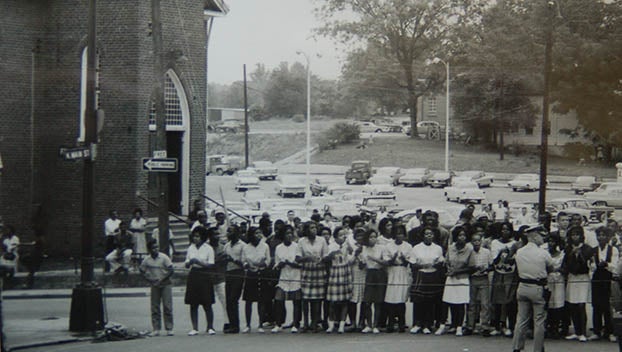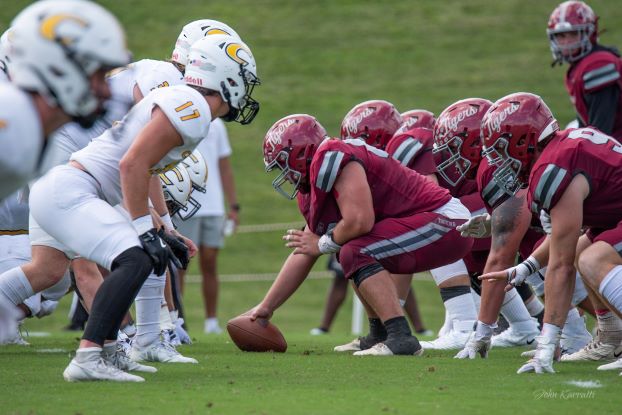‘A remarkable human’: Rev. Samuel Williams Jr inspires community
Published 11:33 am Sunday, April 28, 2024
|
Getting your Trinity Audio player ready...
|
When you look back over the Civil Rights movement, over everything from Brown v. Board of Education to the events 10, 15 years later in Farmville, the story is incomplete without mentioning Rev. Samuel Williams Jr.
Father. Pastor. Teacher. Historian. Activist. The words and actions of Rev. Williams has inspired generations of men and women in Farmville, from those who listened to his sermons to those who asked questions about the town’s history and others who walked with and were arrested with him in the fight for civil rights.
“The word I use to describe Rev. Williams is ever present,” said Moton Museum Director Cainan Townsend. “(He is) a pillar in this community. A remarkable human, a remarkable reverend, minister, an activist. You name it, no matter how bad things have been or are at present, he’d never hesitate to loudly sing the words ‘We shall overcome someday,’ meaning every single word every time he sang it.”
The work of Rev. Samuel Williams Jr.
Trending
One word that keeps coming up in regards to Rev. Williams is history maker and if you look back over decades of Farmville’s existence, past and present, you’ll see that’s true. Think back to July 28, 1963. Rev. J. Samuel Williams Jr. had, along with Rev. Goodwin Douglas, organized the latest in a series of student civil rights demonstrations in town, bringing almost 500 people together. The goal on that July morning was to integrate downtown churches.
Rev. Williams was standing with a group on the steps of Farmville Baptist Church, praying and singing hymns. One portion of the group made it inside of Johns Memorial Episcopal Church, where they sat with then-Longwood University Dean Dr. C.G. Gordon Moss. Another portion of the group tried to worship at Farmville United Methodist Church and was rejected. After trying and being rejected again at Farmville Baptist Church, the group started to pray and sing hymns on the church steps. They were arrested and charged with “disturbing the public worship of God”, the first time that had happened after a “kneel-in” in the South.
“I felt hurt we were being arrested, to prevent us from worshiping God,” Williams said in a 2017 discussion with East Rockingham High School students. “Singing, praying, listening to the message, just like the people inside were doing. I saw that as a great contradiction there. We didn’t know what to expect but it was something we had to do. You never know how it’s going to end up, but you have to be brave enough to do it.”

Protestors stand in front of a downtown Farmville church, in support of integrated worship.
His actions echo his words
And time and again, you see Rev. Williams’ own actions echoing those words. More than a decade before the protest at Farmville Baptist, Williams took part in the April 23, 1951 student strike at Robert Russa Moton High, alongside Barbara Rose Johns and other classmates.
Moton High was the first free-standing segregated high school for African-American students in Prince Edward County. Originally built in 1939, its max capacity was to hold exactly 180 students, but had over 477. As such, there was overcrowding in the classrooms, along with subpar conditions and hand-me-down education materials.
In a 2016 interview with The Herald, Williams described his time at Moton High School as being challenging and dark.
Trending
“We were trying to find our way out of academic darkness,” Williams said, adding the students wanted to “(find) a way out of stereotypes.”
‘The Lord holds them by the hand’
Through the years, Rev. Williams has served in a number of other roles in Farmville.
“We know that he was the historian of our community,” said James Ghee, President of the Prince Edward County NAACP. “We know that his preaching has been outstanding throughout his career. The impact he’s had on our community is unbelievable.”
That impact also came as the pastor of three churches, including Levi Baptist, First Baptist and Beulah Baptist. And now, at age 90, he’s been back at Levi Baptist as the church’s senior pastor. He’s currently recovering, however, after recent health issues.
In conversation, a biblical passage keeps popping up, in reference to Rev. Williams’ work. That would be Psalm 37: 23-24, which states “ The Lord directs the steps of the godly. He delights in every detail of their lives. Though they stumble, they will never fall, for the Lord holds them by the hand.”
Throughout the years, the marches, the protests and calls to minister across the Farmville community, God directed Rev. Williams’ steps, community members say. And now that same direction falls on the rest of the community.
Speaking back in December at the ceremony to rename Watkins Street to Williams Way in Rev. Williams’ honor, Townsend pointed out the challenge that Williams would have for those in the community.
“And when you think about him, think about what he would be doing,” Townsend said. “What he would be doing is standing up for people who need it, pointing out injustice when he sees it and acting on it. And that’s what he would want you to do.”
Editor’s note: This is one of several stories in the April edition of Farmville the Magazine, which is focused on Barbara Rose Johns, Brown vs. Board of Education and the Civil Rights fight in Farmville. Copies of the magazine are available in Downtown Farmville shops.






